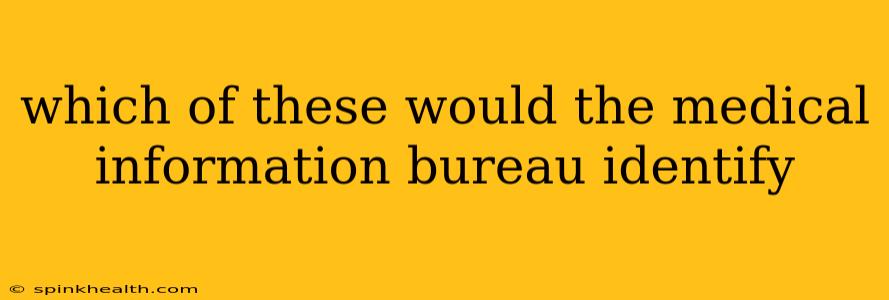Unmasking the MIB: What Information Does the Medical Information Bureau Actually Identify?
The Medical Information Bureau (MIB) – the name itself sounds a little mysterious, doesn't it? It conjures images of shadowy figures and secret files. While it's certainly not as dramatic as a spy thriller, the MIB does play a significant role in the insurance industry, quietly working behind the scenes. But what exactly does it identify? Let's unravel the mystery.
The MIB isn't a government agency; it's a non-profit organization that acts as a clearinghouse for medical information shared by life and health insurance companies. Think of it as a collaborative database, helping insurers assess risk when you apply for coverage. But it doesn't hold everything. Let's explore what the MIB actually identifies and, equally important, what it doesn't.
What Information Does the MIB Identify?
The MIB primarily collects information related to significant health events that could impact your insurability. This includes:
- Serious illnesses: Conditions like cancer, heart disease, stroke, and HIV are examples of information typically reported. The severity and treatment history are often included.
- Major surgeries: Extensive procedures that might affect your long-term health are generally reported to the MIB.
- Hospitalizations: Significant hospital stays, especially if they involve multiple visits or complex treatments, are often noted.
- Specific diagnostic tests: Results from critical tests like cardiac stress tests or certain types of imaging might be included if they reveal serious health issues.
It's crucial to understand that the MIB doesn't track routine check-ups, minor illnesses, or common conditions. They focus on information that carries a substantial risk for insurers.
What Doesn't the MIB Identify?
This is just as important as what is reported. The MIB doesn't collect information on:
- Routine medical visits: A yearly checkup or treatment for a common cold won't show up.
- Mental health conditions (in many cases): The specifics of mental health treatment are often omitted or only broadly reported, although this is subject to change. Privacy legislation plays a key role here.
- Genetic information: The MIB generally does not contain information about genetic predispositions to illness.
- Prescription details for common medications: Unless the medication relates to a serious health condition that is otherwise reported.
How Does the MIB Affect My Insurance Application?
The MIB's purpose is to help insurers make informed decisions. By accessing the database, they can gain a more complete picture of your health history. This can affect your premiums, your eligibility for coverage, or even whether your application is approved. However, the MIB report is only one piece of the puzzle. Insurers will also review your medical records and may conduct further investigations.
What if My Information is Incorrect in the MIB?
If you believe there's inaccurate information in your MIB file, you have the right to dispute it. The process generally involves contacting the MIB directly and providing supporting documentation to correct any errors.
Can I Access My MIB File?
You have the right to access your own MIB file. You can request this information directly from the MIB, which outlines the process on their website. However, remember that you might not fully understand the medical terminology used.
In conclusion, the Medical Information Bureau is a powerful tool for insurance companies, but it's not a complete picture of your health. It focuses on significant medical events that might impact insurability, and it's important to understand both what information it contains and what it doesn't. By understanding its role, you can be better prepared when applying for life or health insurance.

